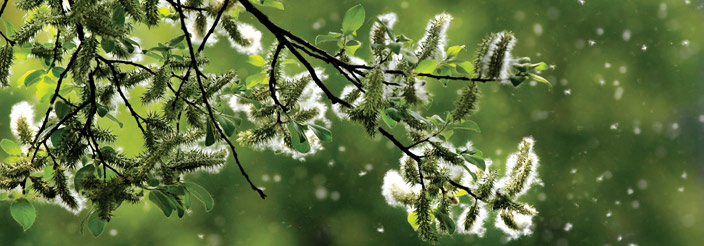
Editor’s Note: Due to the shifting nature of health information at press time, Prime is being proactive by offering the allergy-related help you will need as the season unfolds.
By Jonathan Evans
Herbal Information Specialist for the Herbarium
Spring has come again, and so have the seasonal allergies. Because of the mild winter and climate change (look it up, it is real) the predictions are that a bumper crop of ragweed is due. In a normal spring, grasses, trees and flowering plants will bloom at different times, spacing out the pollen distribution. But this is New England and we haven’t had a normal spring in years. Cold snaps, rainy periods and then bursts of warm sunny spells are throwing off the plants’ schedules. This leads to overpowering amounts of pollen from several sources hitting us simultaneously, and that overwhelms our immune systems.
Simply put, our immune systems go into overdrive and become hyper-sensitive, and our bodies view the innocuous pollen as a threat to our systems. The body is producing mucus as a response to the allergens, trying to clear out the offending particles. Inflammation causes swelling, wheezing, and watery eyes – all the classic symptoms. This is also a time when people think they are coming down with a cold, when in most cases it is an allergic reaction. Many people who have never suffered from allergies are finding themselves overwhelmed and feeling lousy.
Most over-the-counter products offer little in the way of symptom relief, then people head for the allergy testing which in many cases, I have not found to be helpful.
My theory is simple: If you are already oversensitized, you are probably exhibiting more allergies than you truly have. I have had people come in with the test results showing they are allergic to almost everything but water, which truly cannot be the case. I am not saying the testing is bad, but I do not know if that should be your first choice. As always, check with your physician and remember individual results may vary.
Try these for allergies
There are many herbal remedies available in tea, capsule, and liquid extract forms. Some of the ingredients you should look for include:
Eyebright – This herb soothes itchy scratchy eyes and reduces the body’s histamine response
Echinacea – This popular herb reduces inflammation of the mucus membrane and acts as a mild antihistamine
Horseradish – This root vegetable acts as a decongestant, bronco-dilator, and opens clogged sinuses and breathing passages
Nettles – This perennial flowering plant works as an antihistamine, and is anti inflammatory
Quercetin and Bromelain – Quercetin is a flavonoid, Bromelain is an enzyme, both have anti inflammatory properties and help prevent the overproduction of histamines
American Ephedra – This herb, also known as Mormon Tea, opens breathing passages
Turmeric – This spice is renown for its anti inflammatory properties
Vitamin C – This vitamin, often associated with cold and flu treatment, has anti-inflammatory action, and thins mucus.
The homeopathic approach
For those who are afraid certain ingredients might negatively interact with prescription medications, there are several homeopathic remedies that are safe to use with prescriptions.
Don’t be alarmed when the ingredients might include some of the items that you are allergic to.
That is the beauty of homeopathy – “like cures like” but in an extremely dilute solution. Essentially, your body recognizes the allergen ingredient and responds accordingly. Example: Sulphur would burn your skin, but homeopathic sulphur is used to ease inflamed skin and burns. Poison ivy causes skin rashes and itching, yet the main ingredient in a homeopathic poison ivy remedy is indeed poison ivy, many times diluted. Conventional science says it is a placebo effect; the subject believes it will work. Many veterinarians use homeopathic medicines on their patients. How did the vet get the horse to believe the homeopathic would work? … Just asking…
Local honey and pollen
Another approach to allergies is the use of local honey, and sometimes, bee pollen. This idea mimics homeopathy and the idea behind vaccinations. Give the body a small amount of the allergen and the body will produce antibodies to be able to fight the real thing. Local honey would contain small amounts of local pollen and over time, it is hoped the person would reduce their reaction to the allergen.
This approach does take a bit of time if it is going to work, so it is best to start very early before your allergy season. The other problem is when people use the pollen itself, it is extremely important to use only a grain or two of the pollen at one time, otherwise you can set yourself up for a massive allergic reaction – or worse. I had one poor soul who read on the internet that he should use a teaspoon of pollen several times a day. He couldn’t understand why his allergy attacks seemed to worsen.
There are homeopathic doctors who can custom design a remedy for a person, or there are commercial formulas that are specifically designed for a particular region of the United States.
Whatever course of treatment you may choose, herbal formulas seem to work the best. I have found over the years that taking the formulas either kicked my immune response out of overdrive, or my tolerance of the allergens increased. Technically I do not know nor do I care. I can breathe in the spring and fall of the year and do not suffer the miseries of allergy season as I once did, and many still do.
— Jonathan
Send questions on botanical remedies to: Natures Rx: Jonathan Evans at herbarium258@gmail.com, or by regular mail to: The Herbarium, 264 Exchange St., Chicopee, MA 01013. If requesting additional info, include a self-addressed stamped envelope.